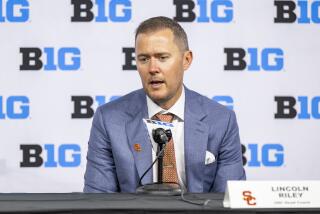Official Urges More Training for Teachers
- Share via
Asserting that improving the public schools depends on elevating teaching to a “first-class profession,” U.S. Secretary of Education Richard W. Riley on Tuesday called on states to base teachers’ pay on their skills and to create a three-tier licensing system similar to that in place for doctors.
In his sixth annual speech on the state of American schools, delivered to an audience of educators at Cal State Long Beach, Riley urged dramatic changes in the way teachers are trained, recruited, tested, licensed, refreshed and paid.
The current system, he said, is cumbersome and does little to raise teachers’ skills or attract new blood. As a result, he said, “a growing number of school districts are having to throw a warm body into the classroom, close the door and hope for the best.”
More broadly, Riley said, the news out of America’s public schools is relatively upbeat. Nearly every state, including California, has adopted specific academic standards, test scores for math, science and reading are on the rise, and access to college is improving.
But Riley tempered each sign of progress with a reminder of difficult challenges. The academic standards adopted by most states are not ambitious, the gap in achievement between the children of comfort and the children of poverty is growing, and rundown schools need billions of dollars for modernization.
Riley spent nearly 40% of the speech on issues related to teacher quality and supply. He was particularly blunt in calling for a nationwide effort by universities to upgrade the preparation of teachers.
“Our colleges of education can no longer be the sleepy backwaters that too many of them have been,” he said.
Professors, he said, should be paid and promoted in part based on their work with teacher candidates as well as on their research and the articles they publish.
As part of his three-tier licensing proposal, Riley repeated President Clinton’s call for states to create rigorous tests of knowledge and teaching skills as a gateway to an “initial” one-year license renewable for three years. Such tests are under development in California.
To achieve permanent status, Riley said, teachers’ performance should be reviewed by a panel of peers in addition to a principal--a system already in place in a number of cities nationwide and, in a different form, under discussion in California.
Finally, he said, to become a top-paid teacher, an instructor should have to pass a certification exam given by the National Board of Professional Teaching Standards. California now grants teachers who have passed that exam a $10,000 onetime bonus while teachers in Los Angeles get a 15% salary increase.
In a similar fashion, doctors progress from being interns to residents to board-certified physicians.
California Secretary of Education Gary Hart praised Riley for focusing on teacher quality. “We’ve got to do a better job of paying teachers and improving working conditions,” he said.
Otherwise, he said, efforts to raise academic standards for students will have little impact.
Riley characterized his proposals as suggestions aimed at sparking a national dialogue on the status of teaching. The administration does not intend to develop legislation to promote these goals or back them with federal funds.
But with the nation needing to hire more than 2 million new teachers over the next decade, he said, the need for change is urgent.
“We’re not going to be able to get good teachers on the cheap anymore,” he said. “We can no longer fiddle around the edges.”
Riley said that if the nation wants to raise standards for teachers it must be willing to pay them more.
Nationally, teachers earn about $38,000 annually while California teachers make, on average, about $43,000.
Aside from pay raises, states could make teaching more attractive by streamlining laws regarding pensions, credentials and seniority, so that teachers can move more easily from district to district and state to state. Now, senior teachers who leave one school district cannot easily get a job elsewhere without taking a pay cut.
He also said his department would commission a national study on the rigor of state licensing exams, create a national clearinghouse on teaching jobs and set up a new commission on math and science teaching. Riley said former astronaut and U.S. Sen. John Glenn would head that panel.
But he said the states and school districts--not the federal government--must take the lead in ending the hiring of teachers who are not completely trained, reiterating Clinton’s challenge for them to do so within five years.
That will be difficult in California, which now employs nearly 30,000 uncredentialed teachers.
Noting that California needs to hire about 260,000 new teachers over the next decade, state schools chief Delaine Eastin said that ending the use of emergency teachers would require a commitment similar to what was needed to send a man to the moon.
More to Read
Sign up for Essential California
The most important California stories and recommendations in your inbox every morning.
You may occasionally receive promotional content from the Los Angeles Times.













